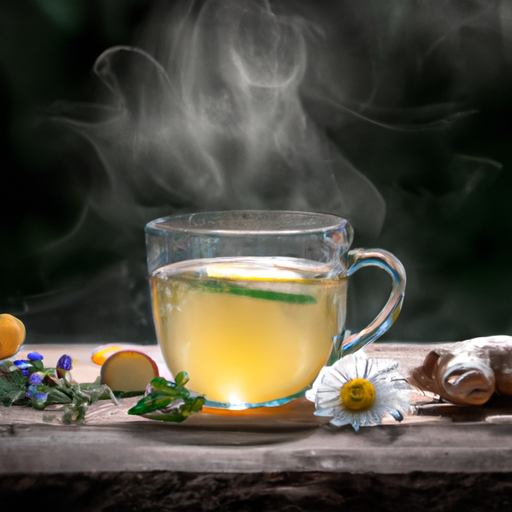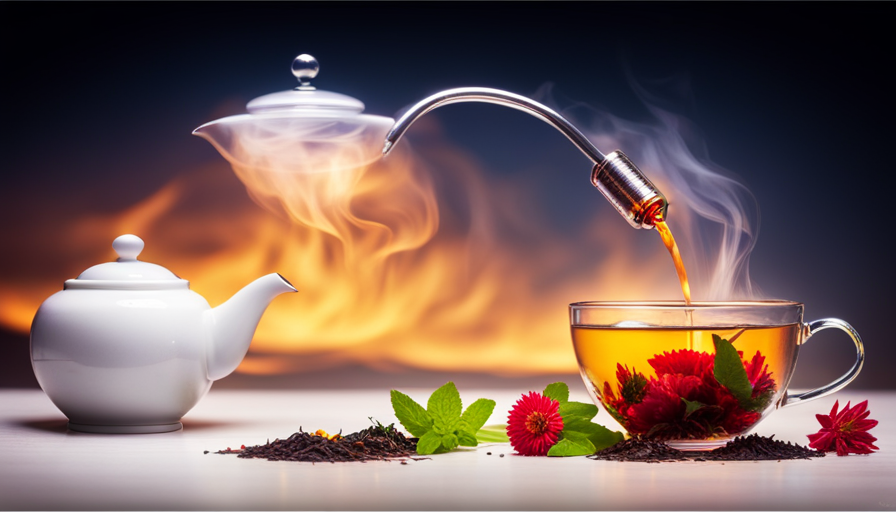Picture this: you wake up in the morning feeling bloated and uncomfortable, your bowels not quite cooperating. You’re searching for a natural solution to ease your discomfort and get your digestive system back on track.
Look no further than herbal teas, my friend. These delightful brews have been used for centuries to promote healthy digestion and relieve digestive issues. In this article, we will explore the top herbal teas that are known to be good for your bowels.
From the soothing and refreshing peppermint tea to the calming chamomile tea, we will uncover the benefits of each herbal infusion. We will also delve into the power of ginger tea, dandelion tea, fennel tea, licorice root tea, and senna tea when it comes to promoting regular bowel movements and reducing bloating.
So, grab your favorite mug and get ready to discover the wonders of herbal teas for your bowels.
Key Takeaways
- Peppermint tea: Relaxes gastrointestinal muscles, relieves indigestion, bloating, and stomach cramps, alleviates symptoms of irritable bowel syndrome (IBS), soothes the lining of the intestines, and alleviates symptoms of diarrhea.
- Chamomile tea: Reduces inflammation in the digestive tract, relieves indigestion and stomach cramps, soothes the lining of the digestive tract, and reduces inflammation in conditions like IBS and gastritis.
- Ginger tea: Stimulates digestion, relieves nausea, bloating, and indigestion, has anti-inflammatory and immune-boosting properties, improves nutrient absorption, prevents stomach upset, and alleviates symptoms of inflammatory bowel disease.
- Dandelion tea: Acts as a natural diuretic, promotes healthy bowel movements, supports liver function and detoxification, promotes increased urine production, flushes out toxins, stimulates the digestive system for regular bowel movements, and aids in detoxification.
Peppermint Tea
If you’re looking for a refreshing way to support your bowels, try sipping on a cup of cooling and invigorating peppermint tea that’ll transport you to a serene garden filled with fragrant mint leaves dancing in the breeze.
Peppermint tea isn’t just a delicious beverage, but it also offers numerous benefits for digestion. The natural compounds found in peppermint leaves, like menthol and menthone, have been shown to relax the muscles of the gastrointestinal tract, helping to relieve symptoms of indigestion, bloating, and stomach cramps.
Studies have indicated that peppermint tea can help alleviate symptoms of irritable bowel syndrome (IBS), a common digestive disorder characterized by abdominal pain, bloating, and changes in bowel habits. Peppermint tea has been found to reduce spasms in the gut, promoting better digestion and reducing discomfort. Additionally, peppermint tea has a soothing effect on the lining of the intestines, which can help alleviate symptoms of diarrhea.
Incorporating peppermint tea into your daily routine can be a simple and effective way to support your bowels and promote healthy digestion.
Now, let’s explore the benefits of chamomile tea, another herbal tea that can provide relief and relaxation to your digestive system.
Chamomile Tea
Sipping on a warm cup of chamomile, like a soothing balm for the digestive system, can bring gentle relief to your gut. Chamomile tea has been used for centuries to aid digestion and promote overall gastrointestinal health. Here are some benefits of chamomile tea for digestion:
-
Reduces inflammation: Chamomile contains compounds that have anti-inflammatory properties, which can help soothe the lining of the digestive tract and reduce inflammation in conditions such as irritable bowel syndrome (IBS) and gastritis.
-
Relieves indigestion: Chamomile tea can help relax the muscles of the gastrointestinal tract, allowing food to move more easily through the digestive system. This can help relieve symptoms of indigestion, such as bloating, gas, and abdominal discomfort.
-
Calms stomach cramps: Chamomile tea has antispasmodic properties, which means it can help relax the muscles in the digestive tract and relieve stomach cramps and spasms.
Incorporating chamomile tea into your daily routine can be a simple and natural way to support your digestive health.
As we transition to the subsequent section about ginger tea, another herbal tea known for its digestive benefits, let’s explore how ginger can provide relief for your bowels.
Ginger Tea
When you add ginger to hot water, it creates a fragrant and invigorating beverage that can help ease digestive discomfort and promote a healthier gut. Ginger tea has been used for centuries for its medicinal properties and is known for its numerous health benefits.
Here are some key benefits of ginger tea:
-
Digestive Aid: Ginger has been shown to stimulate digestion and relieve nausea, bloating, and indigestion. It can help improve the absorption of nutrients and prevent stomach upset.
-
Anti-Inflammatory: Ginger contains powerful anti-inflammatory compounds called gingerols, which can help reduce inflammation in the body and alleviate symptoms of inflammatory bowel disease.
-
Immune Booster: Ginger tea is rich in antioxidants that can strengthen the immune system and protect against infections and illnesses.
To make ginger tea, simply slice fresh ginger root and steep it in hot water for about 10 minutes. You can also add a teaspoon of honey or lemon juice for added flavor.
Moving on to the next herbal tea, dandelion tea has its own set of benefits for the bowels.
Dandelion Tea
Dandelion tea is a herbal beverage that I’ve found to be beneficial for various aspects of my health. Firstly, it acts as a natural diuretic, promoting increased urine production and helping to flush out toxins from my body.
Additionally, it supports liver function and detoxification, aiding in the removal of harmful substances and supporting overall liver health.
Lastly, dandelion tea has been known to promote healthy bowel movements, relieving constipation and improving digestive health.
Acts as a Natural Diuretic
For those seeking a gentle way to promote healthy digestion, a cup of herbal tea can mysteriously help to naturally flush toxins from the body. Dandelion tea, in particular, acts as a natural diuretic, making it a beneficial choice for those looking for natural remedies for constipation.
By increasing urine production, dandelion tea helps to eliminate excess water and waste from the body, relieving bloating and discomfort. Additionally, this herbal tea stimulates the digestive system, promoting regular bowel movements and preventing constipation.
The benefits of herbal teas for digestion are well-documented, with many studies supporting their effectiveness in improving overall gut health. Furthermore, dandelion tea supports liver function and detoxification, making it an excellent choice for those looking to support their body’s natural detox processes.
Supports Liver Function and Detoxification
Incorporating dandelion tea into your daily routine can assist in promoting optimal liver function and facilitating the body’s natural detoxification process. Dandelion root has been used for centuries as a liver cleanse and is known to support the liver in its crucial role of detoxifying harmful substances from the body.
The liver is responsible for breaking down toxins and eliminating them through bile production. Dandelion tea contains compounds that stimulate bile production, aiding in the detoxification process. Additionally, dandelion tea has diuretic properties, helping to flush out toxins through increased urine production.
This natural detoxification effect not only supports liver function but also promotes healthy bowel movements. By incorporating dandelion tea into your daily routine, you can support your liver’s natural detoxification process, promoting overall digestive health.
Promotes Healthy Bowel Movements
To keep things moving smoothly in your digestive system, dandelion tea can help ensure your body’s waste disposal system operates like a well-oiled machine. Drinking herbal tea has numerous benefits for digestion, and incorporating it into your daily routine can promote better bowel health.
Herbal teas, such as dandelion tea, have been used for centuries to support healthy digestion and relieve constipation. The natural compounds found in dandelion tea, including flavonoids and fiber, can aid in the breakdown of food and stimulate regular bowel movements. By incorporating dandelion tea into your daily routine, you can support your body’s natural detoxification processes and improve overall digestive function.
Now, let’s move on to the benefits of fennel tea for bowel health.
Fennel Tea
Try sipping on some warm, aromatic fennel tea to soothe and regulate your bowels. Fennel tea has been used for centuries due to its numerous health benefits, including its positive effects on digestion. This herbal tea is known for its ability to relieve bloating, gas, and indigestion, making it a great option for promoting healthy bowel movements.
One of the main benefits of fennel tea is its ability to relax the muscles in the intestines, which can help to relieve constipation. It also has carminative properties, which means it can help to prevent the formation of gas in the intestines, reducing the likelihood of bloating and discomfort.
To make fennel tea, simply steep one teaspoon of crushed fennel seeds in a cup of hot water for about 10 minutes. You can also add a squeeze of lemon or a teaspoon of honey for added flavor, if desired.
Incorporating fennel tea into your daily routine can be a natural and effective way to promote healthy bowel movements. Now, let’s move on to the next herbal tea that can benefit your bowels: licorice root tea.
Licorice Root Tea
One sip of licorice root tea and you’ll be amazed at its ability to naturally support your digestive system. Licorice root, scientifically known as Glycyrrhiza glabra, has been used for centuries in traditional medicine for its numerous health benefits. Here are some of the key benefits of licorice root tea:
-
Soothes Digestive Discomfort: Licorice root contains compounds that help soothe inflammation and irritation in the digestive tract. It can provide relief from conditions like indigestion, heartburn, and stomach ulcers.
-
Supports Healthy Bowel Movements: Licorice root tea has mild laxative properties that can help promote regular bowel movements. It can be particularly useful for those experiencing occasional constipation.
On the other hand, it is important to be aware of potential side effects associated with licorice root tea:
-
High Blood Pressure: Licorice root contains a compound called glycyrrhizin, which can cause an increase in blood pressure if consumed in large amounts or for prolonged periods. It’s advisable to limit the intake of licorice root tea if you have high blood pressure.
-
Hormonal Imbalances: Licorice root may affect hormone levels in the body, particularly cortisol. Individuals with hormonal imbalances or conditions such as polycystic ovary syndrome (PCOS) should exercise caution when consuming licorice root tea.
Now, let’s move on to the next herbal tea that can benefit your bowels – senna tea.
Senna Tea
I just finished discussing the benefits of Licorice Root Tea for bowel health, and now I want to shift our focus to another herbal tea that’s known for its positive effects on the bowels: Senna Tea.
Senna tea is derived from the leaves of the Senna plant, which contains compounds called anthraquinones. These compounds have a natural laxative effect on the body, making Senna tea a popular choice for those seeking relief from constipation or irregular bowel movements.
When consumed, the anthraquinones in Senna tea stimulate the muscles in the intestines, promoting bowel movements and helping to alleviate constipation. This herbal tea is often recommended for short-term use, as prolonged use can lead to dependence and potential negative effects on the bowels.
It’s important to note that while Senna tea can be beneficial for those experiencing constipation, it shouldn’t be used as a long-term solution. If you have chronic bowel issues, it’s best to consult with a healthcare professional to determine the underlying cause and develop an appropriate treatment plan.
Senna tea can be a helpful herbal remedy for improving bowel health, particularly for those struggling with constipation. However, it should be used in moderation and under the guidance of a healthcare professional to avoid any potential risks or complications.
Frequently Asked Questions
What are the potential side effects of drinking herbal teas for bowel health?
Potential risks of drinking herbal teas for bowel health include allergic reactions, interactions with medications, and digestive issues. It’s important to consult with a healthcare professional before trying any herbal tea. There are alternative ways to support bowel health, such as eating a balanced diet and staying hydrated.
Can herbal teas be used as a long-term solution for improving bowel movements?
Herbal teas can be a helpful alternative remedy for improving bowel movements, but they shouldn’t be solely relied upon for long-term effects. It’s important to consult with a healthcare professional for a comprehensive approach to bowel health.
How often should I drink herbal teas to see improvements in my bowel movements?
I recommend drinking herbal tea daily for optimal digestive health. Regular consumption can lead to improvements in bowel movements, as herbal teas are known to have beneficial effects on the gastrointestinal system.
Are there any contraindications or precautions to consider when consuming herbal teas for bowel health?
When consuming herbal teas for bowel health, it is important to be aware of potential contraindications and take necessary precautions. These may vary depending on the specific herbs used and individual health conditions.
Are there any specific recommendations or guidelines for choosing the best herbal tea for my individual bowel health needs?
When choosing herbal tea for digestive issues, it’s important to consider your individual needs. Look for teas with soothing ingredients like peppermint or chamomile, and avoid those known to irritate the bowels, such as senna or cascara.
Conclusion
In conclusion, incorporating herbal teas into your daily routine can be beneficial for maintaining healthy bowels. Peppermint tea is known for its soothing properties and can help relieve digestive discomfort.
Chamomile tea has anti-inflammatory effects and can promote regular bowel movements.
Ginger tea aids in digestion and can alleviate bloating and gas.
Dandelion tea acts as a natural diuretic and can help flush out toxins from the body.
Fennel tea can alleviate constipation and promote healthy digestion.
Licorice root tea has mild laxative effects and can provide relief from constipation.
Senna tea, although effective in relieving constipation, should be used with caution and under medical supervision due to its strong laxative properties.
So, why not sip on a cup of herbal tea and give your bowels a helping hand? Remember, a healthy gut is a happy gut!










